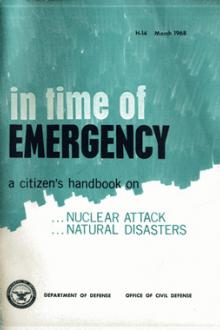Déjà Vu: A Technothriller by Hocking, Ian (red scrolls of magic .TXT) 📕

Read free book «Déjà Vu: A Technothriller by Hocking, Ian (red scrolls of magic .TXT) 📕» - read online or download for free at americanlibrarybooks.com
Read book online «Déjà Vu: A Technothriller by Hocking, Ian (red scrolls of magic .TXT) 📕». Author - Hocking, Ian
“Hey, Jenny, wait up.”
She turned. It was Mikey. “Hi, Mikey.”
He was in his early twenties. Not as young as Jennifer, but young enough for them to feel an affinity. She was the resident wonder child and it often made her feel excluded. Mikey wanted to play outsiders with her. He was sweet.
Mikey adjusted his glasses and grinned. “You gotta see this.”
“See what? I’ve got a meeting with Michaels in, like, half an hour.”
“But you gotta come.” He grabbed her by the arm and pulled her towards the nearest stairwell. He began to talk. He had a habit of twisting his fingers in his beard as he did so. Jennifer liked it. This was the first time he had ever spoken about his research – strictly speaking, he was forbidden – and she felt like an honorary member of his weird, fun club. “See, we got her all fired up but the notes we had from the last time weren’t entirely complete. There were some...inconsistencies.”
“Inconsistencies? What are you talking about?”
“Follow me.”
They arrived, some minutes later, at the door to Mikey’s laboratory. Rather ominously, blue flashes could be seen through the gap underneath. “Don’t worry about those. Some last minute repairs.” He opened the door and they went inside.
The room was large. It had a low ceiling but extended ten metres either side of her. The floor was covered in white tiles and sloped towards the centre. There, dwarfing everything else in the room – even Mikey’s friend, Groove, with his enormous welding gun – was a object that almost defied description. It was clearly a tank full of liquid, but the liquid shifted and stirred as though it was alive.
“Come take a look,” Mikey said.
Jennifer approached the tank. She saw blues, reds, yellows, all mixing together. A memory surfaced. It was her father. She had been four years old. He had put three or four watery splodges of paint on an empty dinner plate. Then, barely on the edge of this mess, he had dropped a tear of washing-up liquid. The effect was immediate: the colours panicked, chased into one another, mixed, pulled back. She had giggled and begged to do it herself. All the while, whispering in her ear, he spoke of particle diffusion.
“It’s incredible.”
“Yeah. Touch the surface.”
Mikey stared at Jennifer’s face. She reached up and placed a hand on the surface. It was warm. A cloud of red appeared from nowhere and swelled under her fingertips. It grew warmer. She took her hand away and the red departed, replaced by an inky blue.
Mikey took her hand in his. A distant part of her felt that his action was unwelcome, but the device held her attention. “The things in there are attracted by the static in your fingertips.”
“Really?” she said dreamily. She hardly noticed that Mikey was stroking her fingers.
“Mikey, quit dribbling over the guests.”
Jennifer looked round and saw that Groove had stopped welding. He was clearly pleased with his one-liner. The welding gun rested on his shoulder, pointing skyward, and his visor was snapped back. Mikey released her fingers. The moment was over.
“Groove, shut the fuck up.”
“Whatever. Hey, Jennifer.”
“Hi, Groove. You haven’t seen me, right?”
Jennifer held his gaze. Mikey or no Mikey, she had no permission to be there. They all knew it. It was a rule like the mandatory ID tag. If broken, even innocently, there would be royal hell to pay. “It’s cool,” said Groove. He slapped his visor back down and continued welding inside the computer. Jennifer wondered what component could possibly require welding.
Mikey cleared his throat and pulled her into an adjoining room. “Take a look.”
This new room was smaller. It was unremarkable apart from four frosted-glass chambers set into one wall. They looked like shower stalls. In the third stall, Jennifer could see a red stain on the interior. Mikey said, “Computer, open and activate cubicles one and two. Safe mode. No microbots.”
“Microbots?” asked Jennifer.
“We’ve been having some problems with them.” He chucked a thumb in the direction of the third stall.
“Mikey, are you going to tell me what this is all about?”
Mikey twitched. He looked left and right. He whispered, “The notes we’ve been using. We wouldn’t have got very far without them. We’re standing on the shoulders of giants, here.”
“Which giants?”
He grinned. “David Proctor and Bruce Shimoda. Ring a bell?”
Jennifer frowned. “You know they do. That’s my father and his research partner. But they abandoned their research twenty years ago.”
“And now we’ve taken over. I knew you’d be interested.”
Mikey stepped into one of the cubicles and put on the virtual reality headset. Jennifer, reluctantly, did the same. “You’re gonna love this. You know what we call it?”
“What?”
“Project Asgard. Computer, run that bad boy.”
Songs at My Funeral
David stepped slowly, as though his footfalls might crack the fragile floor and drop him into the crypt below. Organ music echoed from the stone, from the dark pews, and the dull stained glass. He bowed his head.
He expected to be seated at the rear, but his jailers told him to keep walking. The coffin loomed. He wondered how many pieces were inside. The church was almost empty. Four or five Japanese sat in the front row. David didn’t recognise any of them, but he could guess: brother, mother, sister...aunt, cousin, who knew. There were no friends. What had Bruce been doing for the last years of his life? Had he been hiding?
The family weren’t crying. David guessed that they had already buried him, years ago. Perhaps even twenty years ago. But Bruce’s family lived in Japan. Why were they here? Did they know that he was going to die? Did he tell them?
“Sit down,” said Mary.
He did so. It was the foremost pew on the left-hand aisle. He sat by a young man in his mid-thirties. The two jailers sat immediately behind him. His feet could stretch out. Not far, because of his chains; not so far they would reach the coffin.
Coffin, he thought. Now there’s a horrible little word.
Yet the organ





Comments (0)